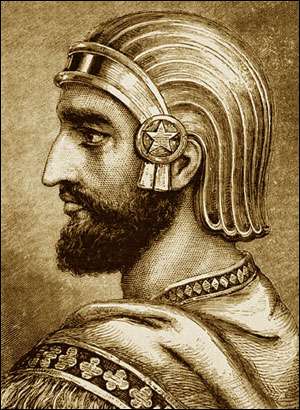Cyrus the Great

In scope and extent his achievements ranked far above that of the Macedonian king, Alexander who was to demolish the empire in the 320's but fail to provide any stable alternative.—Charles Freeman in 'The Greek Achievement
Cyrus (Persian: Kourosh) was one of the most famous rulers in history. He was born a prince of a recently-settled Iranian tribe, the Persians. According to a legend (familiar in biographies of conquerors) the previous king, at Cyrus' birth, heard in a dream that Cyrus was destined to seize his kingdom, whereupon the King ordered him abandoned. He was found by a herdsmen and raised as a son. Eventually. he proved himself as a warrior and came back to avenge himself. The more probable version of his story is that he was a vassal of the Medes, another Iranian tribe, and in a series of campaigns made himself king of both the Medes and the Persians. From their he began a life of conquest that spread until he had the largest and perhaps most successful empire yet created in the world.
One of the most notable things about Cyrus was not just his skill as a warrior, but his skill as a politician. Previous conquerors had ruled by fear alone. Cyrus grasped the fact that if he was magnanimous and made enough Pet the Dog gestures to his new subjects he would win their willing submission from comparison with the probable alternatives. In essence he conquered as much through bribery as through war. It would probably be overly cynical to say that this was all Pragmatic Villainy. Being a gracious conqueror(by comparison) seems to have fit his personality so well that there was some truth to it. In essence, while he was a bastard, he was a magnificent one. Among the most famous of his gestures was encouraging the resettlement of the Jews in exile in Babylon. This got him a curious place in The Bible as the only gentile prince to be specifically named as a deliverer of Israel.
- Asskicking Equals Authority
- Badass Bookworm: He began the organization of Persia's system of rule with satraps and an intricate network of messengers.
- The Conqueror
- Courier: Persian couriers were famous. It is from them that the US Postal Service gets the famous Creed "Neither rain, nor wind, nor snow, nor hail..."
- Crowning Moment of Heartwarming: Sparing Croesus' life.
- Due to the Dead: It is said that when Alexander the Great came to Cyrus' tomb he read the inscription, "Whoso thou art that cometh(for come I know thou must). And whence thou comest from. I am Cyrus, King of the Persians. Grudge me not what little earth remains."
- Fair For His Day: Because he had hit upon the secret that pragmatic generosity won submission and sometimes loyalty he was a more pleasant ruler than the Babylonians, let alone the Assyrians(whose idea of public relations was to build giant monuments boasting about what Complete Monsters they were) .
- Founder of the Kingdom
- Germans Love David Hasselhoff: The Bible loves Cyrus. He's the only gentile called "annointed" i.e. "messiah".
- The Great King
- Happily Married: With his wife, Cassandane.
- Improvised Weapon: According to one tale, he won a battle by herding baggage camels ahead of his army so that the enemy horses would be scared off by an unfamiliar scent.
- It Is Pronounced "Tro-PAY": In Old Persian, his name would be pronounced "Kurush" and in modern Persian the name is "Kurosh."
- Magnetic Hero
- Magnificent Bastard
- Noble Savage: Whether acting or real or a mixture of both, he played this role well, knowing how to act like the steepe peoples idea of what a real Badass warlord should be: he could act honorable , dispense Sacred Hospitality with style, and fight well. And yes he could be "savage" as well as "noble" at times.
- He also knew how to change roles and act like a Babylonian God-Emperor with a splendid display of Ermine Cape Effect. He was enough of a politician to be flexible.
- Proud Warrior Race Guy: And he played this role remarkably well.
- Rags to Royalty
- Take Over the World
- Shout-Out: When Harry Truman met a number of Zionist leaders he claimed credit for his part in assisting their cause by saying, "I am Cyrus, I am Cyrus, I am Cyrus."
- Underestimating Badassery: While he was busy conquering Ionia, some emissaries came to him and told him that if he did not slow down he would have Sparta to answer to. Cyrus' army had gone farther then his intel reports, and so he turned to an aide and asked "Who are the Spartans?"
- Young Conqueror: He was this. Unlike Alexander the Great, he was a good ruler of what he conquered.
- Warrior Prince
- Worthy Opponent: Cyrus was a Persian that was actually admired by Greeks.
- You Killed My Son: According to Herodotus (who admittedly liked a good yarn) a prince Cyrus was fighting against had on a whim forced one of his nobles to eat his own son. This noble for some odd reason happened to be in command of a large part of the army on the day of battle and refused to fight, leaving Cyrus with the victory. If this story is true it is a clinical example of Stupid Evil.
- This also worked against him. Cyrus killed the prince of the Massagetae in battle, and his enraged mother, Queen Tomyris (queen regnant, not the king's wife), took command of the army and defeated Cyrus, who was killed in the battle. Herodotus goes on to say that Tomyris beheaded and crucified Cyrus' corpse, and threw his head in a sack full of blood to "quench his thirst for blood."